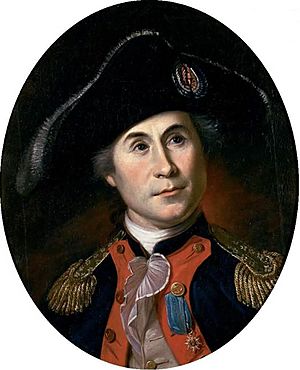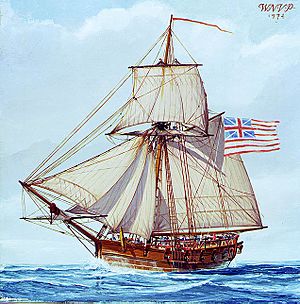Raid on Canso (1776) facts for kids
Quick facts for kids Raid on Canso (1776) |
|||||||
|---|---|---|---|---|---|---|---|
| Part of the American Revolutionary War | |||||||
 John Paul Jones |
|||||||
|
|||||||
| Belligerents | |||||||
| Commanders and leaders | |||||||
George Smith (merchant) (POW) |
|||||||
| Strength | |||||||
| 2 brigs | Approximately 15 fishing vessels | ||||||
| Casualties and losses | |||||||
| None | 1st attack: 3 vessels burned, 1 sunk, 5 prizes, 1 shallop confiscated; 2nd attack: 6 prizes, 1 burned, 1 confiscated | ||||||
The Raid on Canso took place on 22 September – November 22, 1776 during the American Revolutionary War. The raid involved American Continental Navy captain John Paul Jones attacking Canso, Nova Scotia (now part of Canada) and the surrounding fishing villages.
Background
During the American Revolution, Americans regularly attacked Nova Scotia by land and sea. American privateers devastated the maritime economy by raiding many of the coastal communities, such as the numerous raids on Liverpool and on Annapolis Royal.
George Washington's Marblehead Regiment raided Charlottetown, now in Prince Edward Island, on 17 November 1775, and three days later they raided Canso Harbor.
Raid
On September 22, 1776, Canso was attacked by American privateer John Paul Jones. The privateer sailed on the USS Providence and destroyed fifteen vessels, and damaged much property on shore. There he recruited men to fill the vacancies created by manning his prizes, burned a British fishing schooner, sank a second, and captured a third besides a shallop which he used as a tender.
Jones then pillaged the community of Petit-de-Grat and Arichat on Isle Madame, Nova Scotia. The nine ships (300 men) immediately surrendered. On the evening of September 25, a gale droved three of the prizes on to shore and they were destroyed. (The remaining prizes were Alexander, Kingston Packet, Success and Defence.) Jones destroyed John Robin’s fishing business when they plundered and razed the entire establishment. The business of John Robin ended and he did not return until after the war. Jones then sailed to Boston only to return two months later.
On 22 November, John Paul Jones returned to Canso in the USS Alfred. Boats from the ship went ashore and he raided the community, his crews burned a transport bound for Canada with provisions and a warehouse full of whale oil, besides capturing a small schooner. He took 6 prizes, 1 burned, 1 confiscated.
Captain Jones then went on to present-day Sydney, Nova Scotia to free 300 Americans imprisoned in the British coalmines.
Aftermath
Again in 1779, American privateers destroyed the Canso fisheries, worth $50,000 a year to England.
American privateers remained a threat to Nova Scotian ports for the rest of the war. For example, after a failed attempt to raid Chester, Nova Scotia, American privateers struck again in the Raid on Lunenburg in 1782.


